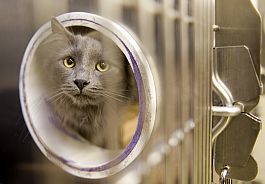Euthanasia by Injection: The Only Choice for Shelter AnimalsSeptember 7, 2011 By Wendy Swift, DVM  Even animals deemed "unadoptable" in shelters deserve a humane death. Michelle Riley/HSUS Euthanasia by Injection (EBI) is considered the most humane way for an animal to be euthanized whether he or she is a personal pet or a shelter animal. When performed properly by trained personnel, EBI is painless, and begins to take effect within seconds. Veterinarians need to be a voice for the animals who are deemed unadoptable in our shelters. They deserve a humane death. Every national sheltering, veterinary and animal welfare organization agrees that the gas chamber does not meet best practices for the industry even when used properly. Improper use of gas chambers (e.g., overloading chambers with multiple animals, use for pediatric or geriatric animal euthanasia, etc.) and use of poorly functioning or handmade chambers (e.g., inappropriate gas concentrations, leaking of gas, etc.) occurs daily resulting in pain and suffering for shelter pets. EBI is the “gold standard” when considering humane euthanasia practices. Why EBI is the Best ChoiceThere are myriad reasons that shelters must stop using the gas chamber, including the following:
Simply put, there are no valid reasons for continuing to use this method of euthanasia. Michigan’s Fight to Ensure Humane Euthanasia for Shelter Pets Grant inspired legislation to ban gas chambers in Michigan. Shelters in Berrien, Branch, Cass, Gratiot, Mecosta, St. Joseph and Van Buren Counties in Michigan still use the outdated and inhumane method of gassing animals. Despite having the tools available to provide EBI, these shelters claim a variety of reasons why they should not transition including cost, perceived less stress on animals and staff, staffing constraints and inability to obtain euthanasia drugs (however, licensed shelters in Michigan that employ EBI-certified technicians can purchase controlled drugs under satellite registration, through their animal shelter staff veterinarian, or by using a direct registration through the Drug Enforcement Administration). All of these have been proven not to be valid reasons to continue gassing shelter pets. We Michiganders love our pets, and we want our shelters to be safe and compassionate havens for those animals who are lost and homeless. Fortunately, SB 423 and SB 424, introduced in June 2011 by Michigan Senators Rick Jones and Steve Bieda, will do just that by ensuring that only EBI will be used in Michigan shelters and by USDA-licensed dealers who broker pets for resale. Animal advocates have named this package of legislation "Grant's Bills," after a friendly dog who did not meet the adoption deadline and was killed in a Michigan animal control shelter's gas chamber. The Michigan legislature should act swiftly to ensure the passage of these bills in an attempt to better the quality of care in Michigan shelters. Every Shelter Pet Deserves a Humane DeathEighteen states—most recently Alabama—have now passed laws prohibiting the gassing of shelter animals, and it's definitely time for your state to join them if it has not already. It’s also important that your state enact direct licensing laws, allowing shelters to procure euthanasia drugs under a comprehensive permitting structure, for situations in which shelters do not have access to a local veterinarian (i.e., in rural and remote areas). Shelter pets deserve better. If you would like more information on EBI, including information on which states have bans on gas chambers and which states have direct licensing laws for shelters, visit the Animal Sheltering website. If you would like to make a difference in your state through legislative change please contact the Humane Society Veterinary Medical Association. Dr. Wendy Swift is currently an associate veterinarian at a private practice in Michigan, Board Member for Michiganders for Shelter Pets, and an HSVMA member. She has eight years of shelter medicine and management experience at an open admission shelter along with an additional 4 years of animal welfare advocacy including promoting spay/neuter. Dr. Swift is a certified EBI and Compassion Fatigue instructor. |
